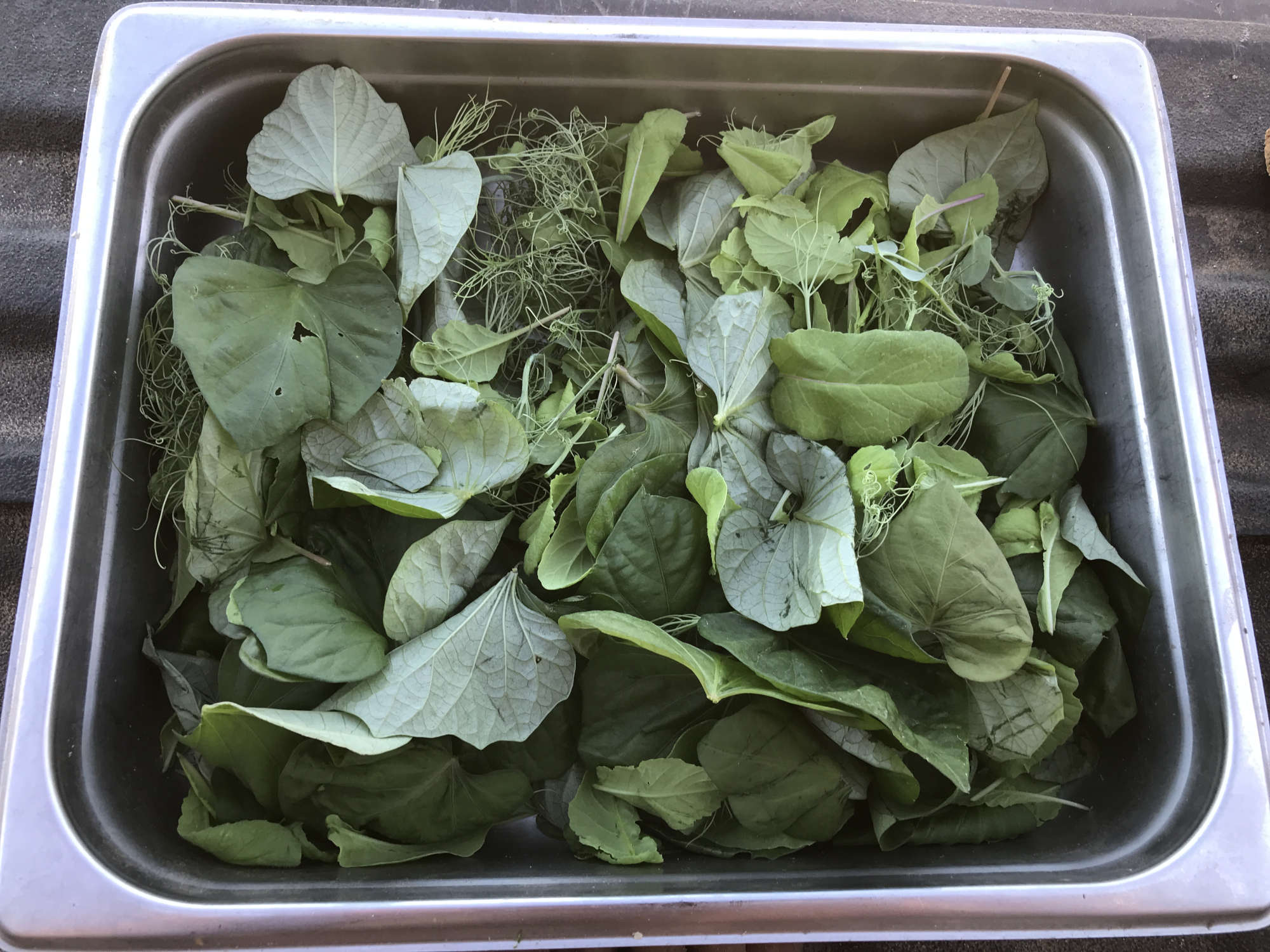
Pea Radish and Sweet Potatoe Greens from a Fresh Garden Harvest
I've written about my romance with pea and radish greens on other gallery photo pages. What's notable about this one is the heart shaped dark green sweet potato leaves. For many years now I've been made these edible leaves a staple of my so-called spinach needs. Apparently spinach to many gardeners doesn't just represent the unique spinach plant, but it's a name given interchangeable for the role of any given leafy green in the culinary arts. Essentially a spinach can then sometimes be broadly considered as a green that's suitable for similar uses to what we commonly think of as the spinach plant. What comes to mind are dishes like soups, salads, sautes, steamed veggies, stews, etc.
In that sense, my go to "spinach-like" plant is the sweet potato green. Not to be perilously confused with yam greens. While the roots may look similar or be sold at markets and groceries stores almost interchangeably they are quite different in many ways. Most obviously yams typically have an orange meat, whereas sweet potatoes are typically whitish-yellow, though I've enjoyed purple Japanese sweet potatoes. Furthermore, as with any cultivars, there can be many colors that have evolved naturally or been human cultivated so that simple color based rules of thumb may not always be a safe bet. As always, a gardener must do their own research before eating anything they have any doubt about.
For me, I've never had a problem safely finding very distinct sweet potatoes, soaking them, or cuttings slips out of them when "eyes" form, planting them in the ground or in containers and letting them grow as wild as I can afford the space for. Not only are they able to overwinter and self propagate as a rugged and resilient perennial, the leafy green yields are hard to keep up with. I've learned not to eat much if any raw, that they are bitter and best if harvested ea2rly and cooked well. Everyone's tolerance to more exotic greens than lettuce and cabbage differs, and some argue it's the job of animals with several stomachs to transform the barely edible vegetation for us, into food products that can be digested more easily. As with anything, we're all different and every claim is debatable.
I'll say that for me personally, I've tried by strict raw, mostly vegan, among other diets and I've arrived at a point where I strongly feel that for many reasons, eating unfermented, undried, or otherwise totally raw food where it's not possible to remove an outer shell, skin, etc. can be a risk. Of course, we all have different so-called, and no-pun intended "risk-appetites".
Given the extreme conditions of my current project, I lean towards fermentation as a way to ensure that harmful microbes have been killed before eating anything fresh from the garden. But that's really only because I have no medical support and the cost and logistics of any medical care from emergency to non-emergency are very prohibitive. I've been quite spoiled over the course of many many years gardening in groups where we could render aid to each other if for any reason we feel ill, and or, town or city medical infrastructure was accessible nearby.
Just as people who travel over seas a lot and have learned hard lessons about pathogenic contamination of food and water sources, and thus develop habits of bringing their own canned food, distilling their own water etc, I'm in a similar situation though with a different risk profile. While I may not be exposed to as many exotic pathogens, even the slightest bit of food poisoning, stomach upset, fever, loss of water through the bowels, could be deadly. Therefore, I'm extra careful with my garden products as they're all grown with pond water and have exposure to the erratic movements of all kinds creatures.
It's not ideal to be restricted in this way, I generally have a very care-free attitude about literally grazing on garden plants without fear that they may have just be the target of a bird dropping or some such befoulment. But again, it's different where I am now, for the time being.